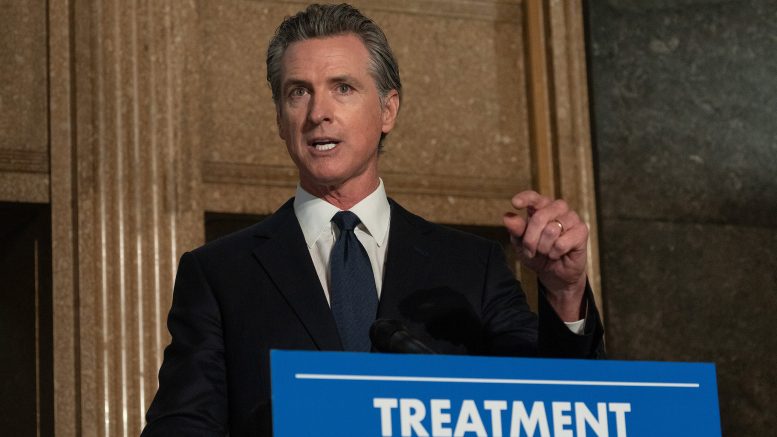It is one of the state’s greatest health needs, companies fail to live up to their policies, and the state does not invest what is needed for enforcement.
By Mark Kreidler, Capital & Main
This story is produced by the award-winning journalism nonprofit Capital & Main and co-published here with permission.
California Gov. Gavin Newsom got busy at the 11th hour. He allocated considerable time to campaign for Proposition 1, a narrowly focused, $6.4 billion mental health measure that was spun as both a fix for substance-addicted homeless people and a boost for suffering veterans in the state.
With barely half the votes counted Wednesday, that measure faced an uncertain fate despite a massive spend by the groups supporting it. But the worthy attention paid to Prop. 1 carried an additional cost: It obscured the larger truth that improved mental health care services for all Californians remains desperately needed.
That need is not being met, pure and simple.
The 2024 installment of the California Health Care Foundation’s annual health policy survey brings this truth into bold relief. The study found that 55% of Californians who tried to schedule a mental health care appointment in the last year said they had to wait longer than was reasonable — and 52% had trouble finding a provider who’d take their insurance.
Among those who said they or someone close to them had needed treatment for serious mental illness, nearly two-thirds — 63% — said “significant” improvement in the system was needed. And more than 80% of the survey’s respondents said it was extremely or very important for the state to increase access to mental health treatment overall.
Those responses, the survey’s authors said, made mental and behavioral care one of Californians’ highest health priorities for the state. At the same time, they wrote, “Dissatisfaction with mental health care is high among Californians, especially those who have direct experience with the system.”
* * *
This isn’t a niche issue. Nearly one in five Californians surveyed reported trying to make an appointment with a mental health care provider in the past year. It is not confined by race, ethnicity or income level, although the foundation’s report confirms a longstanding trend of lower-income people and family members needing and seeking such care more often.
It’s also not a new problem, as the state — and Newsom — are well aware.
For decades, the health industry titans in California have skimped on mental and behavioral care services for their members despite regularly collecting premiums that supposedly pay for such coverage. With many plans wildly understaffed in that area of treatment — often by design, critics say — patients have faced long wait times or found themselves unable to schedule an appointment at all.
Providers generally complain that they try but can’t hire the number of mental health care professionals they need to, while the professionals themselves — and those who study the industry — note that chaotic working conditions, chronic staff shortages and low pay are almost always the true culprit.
“There is very little return [on investment] on mental health services” for the health care companies, Jeff McCombs, a health economist and professor at the University of Southern California, said during a strike by Northern California therapists against Kaiser Permanente in 2022. “As a result, those services have been underfunded for decades.”
Kaiser, the largest health care provider in California, reached a $200 million settlement with the state last year as a result of its consistently dismal performance in providing patients with mental health care appointments and critically needed timely follow-ups. It was only the most recent of several penalties paid by Kaiser over the years for deficiencies in mental health care services.
* * *
That unprecedented settlement may or may not produce an actual, long-lasting change in Kaiser’s behavior, and other top providers in the state long ago concluded that it’s often cheaper to pay the fines than to build out their mental health services to the extent that they’re truly needed.
So what can Newsom do? He can start by either working with (or grinding on) the Legislature to earmark more money for the one agency tasked with wrestling the health care behemoths.
Over the past few years of reporting on this issue, Capital & Main has been told repeatedly that the Department of Managed Healthcare is inadequately staffed to provide the kind of far-ranging enforcement of state rules that would be required to keep Kaiser, Anthem Blue Cross and many others in regular compliance.
One example: Recent state laws have expanded access to mental health care and increased by tenfold the fines providers will pay for illegally denying such access. But the Department of Managed Healthcare is left to police all of that, and with its staffing issues, the department is mostly left to wait for complaints to come through the pipeline or launch longer-term, time consuming surveys of individual health companies.
* * *
Newsom has invested significant political capital in the idea of responding to the state’s mental health crisis. His administration should be closely watching the results of those efforts, because the need for improved services continues to grow. That includes the state’s kids: Between 2016 and 2020, anxiety or depression diagnoses for children ages 3 to 17 in California rose by 70%, according to the Annie E. Casey Foundation.
Bolstering California’s overburdened public health systems is one way to push back on this advance. Forcing profiteering health care companies to do the job their policies say they’ll do is another — and it’s in dire need of some state leadership to get that done.
Copyright 2024 Capital & Main


Be the first to comment on "Why it is time for Newsom and the Legislature to get serious about mental health in California"